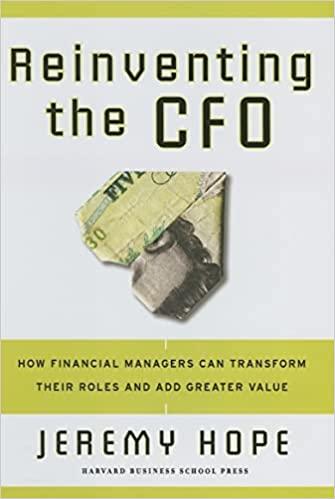| | | cash and marketable securities One year ago, John Doe bought 10,000 shares of Galaxy Entertainment Company at $50 per share. His purchase represents 20 percent ownership in the firm. Today s market value per share is $60. If Galaxy Entertainment is bankrupt and owes $200,000 more in debts than the firm can pay after liquidating all of its assets, what is the maximum loss per share John Doe will incur on this investment? | | | $0 a share | | | | $20 a share | | | | $55 a share, computed as ($50 + 60)/2 | | | | $50 a share | | | | $4 share, computed as (20% $200,000)/10,000 shares The primary goal of financial management is to: | | | maximize current dividends per share of the existing stock. | | | | minimize operational costs and maximize firm efficiency. | | | | maintain steady growth in both sales and net earnings. | | | | maximize the current value per share of the existing stock. | | | | avoid financial distress. For a firm to create value it must: | | | have a greater cash inflow from its stockholders than its outflow to them. | | | | create more cash flow than it uses. | | | | reduce its investment in fixed assets since fixed assets require the use of cash. | | | | avoid payments to the government so dividends can be increased. | | | | avoid the issuance of debt securities. Which one of the following is least apt to encourage managers to act in the best interest of shareholders? | | | Shareholder election of the board of directors, who in turn select managers | | | | Threat of a takeover by another firm | | | | Linking manager compensation to share value | | | | Compensating managers with fixed salaries | | | | Compensating managers with stock options Which one of the following actions by a financial manager least meets the goal of financial management? | | | Increasing current costs in order to increase the market value of the stockholders' equity | | | | Agreeing to expand the company at the expense of stockholders' value | | | | Refusing to lower selling prices if doing so will reduce the net profits | | | | Agreeing to pay bonuses based on the market value of the company stock | | | | Refusing to borrow money when doing so will create losses for the firm Merrimack, Inc., is considering an investment project that generates a cash flow of $1,900,000 next year if the economy is favorable but generates only $900,000 if the economy is unfavorable. The probability of favorable economy is 60% and of unfavorable economy is 40%. The project will last only one year and be closed after that. The cost of investment is $1,500,000 and Merrimack plans to finance the project with $400,000 of equity and $1,100,000 of debt. Assuming the discount rates of both equity and debt are 0%. What is the expected cash flow to Merrimack s shareholders if the company invests in the project? | | | $400,000 | | | | $480,000 | | | | $800,000 | | | | $0 | | | | $1,020,000 Which of the following statements regarding agency problems and costs are correct? I. An agency problem exists when there is a conflict of interest between the stockholders and the management of a firm. II. An agency problem exists when there is a conflict of interest between a principal and an agent. III. An agency cost occurs when firm management avoids risky projects that would favorably affect the stock price because the managers are worried about keeping their jobs. IV. An agency cost occurs when management chooses an action that benefits the shareholders but reduces management compensation. | | | I and II only | | | | II and III only | | | | I, III, and IV only | | | | I, II, and III only | | | | II, III, and IV only Merrimack Inc., had a current share price of $50, and the firm had 1,000,000 shares of stock outstanding. The company is considering an investment project that requires an immediate $15,000,000 investment but will produce a single cash flow of $20,000,000 after 2 years then close. If Merrimack invests in the project, what would the new share price be? Merrimack's cost of capital is 10%. (Hint: consider how the project NPV affects the stock price) | | | $35 | | | | $42.75 | | | | $48.25 | | | | $51.53 | | | | $55 | | | | | | | | |






